Good morning!
Greetings in the name of the Father, the son, and the Holy Spirit.
This people I have formed for Myself; They shall declare My praise. (Isaiah 43:21)
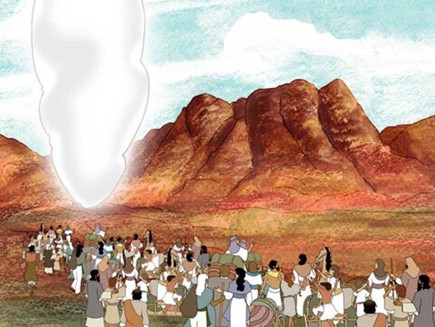
Following Moses, the Israelites walked into the desert from the shore of the Red Sea. They walked on dry ground through the Red Sea. It was a truly special and never-forgettable experience. They experienced God and His love as walking through the Red Sea and watched His mighty hand that destroyed the Pharaoh’s army by returning the water of the Red Sea, but all of these did not help much. The land was dry, and the sun was hot. They were getting dehydrated, and the Israelites were searching for water.
But they kept moving out into the desert of Shur for three days and praying for water. Then they came to Marah, where they found an Oasis. All were comforted because of the oasis. Most of all, all believed it was the answer to their prayer. But they soon found that the water was too bitter to drink. So they called the place Marah (which means “bitter”).
Please imagine what the Israelites felt at that time. The oasis they found after three day’s journey through the desert was useless because it only produced bitter water. If they had not seen the oasis producing bitter water, it would have been easier to endure one more day while praying and hoping to find an oasis providing the water they needed badly. But the bitter water provoked them.
Why? They thought the oasis was the very sign of the answer to their prayer, but they soon realized it was the case. They prayed for water honestly for three days as they walked through the desert. It was the only hope that powered them to keep walking through the water. As the journey approached three days, all water brought with them ran out, but there was no sign of water. So far, even a single oasis was not spotted. Some started fainting due to extreme dehydration. Thus, as soon as they saw the oasis in the middle of the desert, they all believed that their prayer was answered.
The oasis producing bitter water was a real blow to the Israelites. The water they could not drink completely shattered all they prayed for and hoped for in faith. Perhaps, not finding an oasis was easier to endure.
Can you imagine what they felt at that time? Most importantly, it must have been a moment of testing their faith. How logical the sequence of the events was! They prayed for three days as they walked through the desert under the hot sun, and they arrived at an oasis. Was there anyone who did not think that their prayer was answered? None. All immediately became joyful and thanked God because they had found an oasis.
However, as soon as they tasted the water, all spit out the water from their mouths. Although they were extremely dehydrated without finding water for three days, they could not swallow the water. The water was too bitter to drink. The level of bitterness was far beyond their tolerance level, even after three days of dehydration and thirst in the desert. Then they complained to God in a single voice. It was an act of revenge against God for breaking their trust in God. Truly the people could not understand why. The oasis had to produce water that quenched their thirst because they found it after their intensive prayers for three days. All believed the oasis must be God’s answer.
Many struggled to understand. Many analyzed the situation again and again, but none worked. The water brought by the oasis was too bitter to drink, although the oasis should have been the very answer to their intensive and focused prayers given to God for the last three days. Moses, the greatest Godly leader of all time, was one of them who prayed intensively and honestly with the rest of the Israelites. Thus, even Moses struggled to answer to himself and those around him.
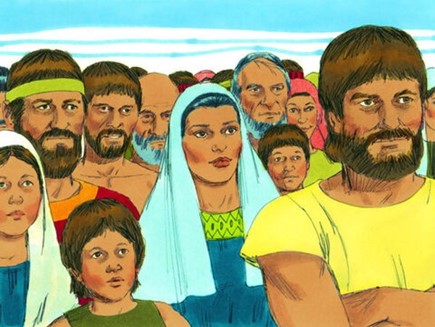
Can we answer why the oasis produced bitter water? Sure, it is tough to answer. Please try to be one of the Israelites, who struggled, got frustrated, and burst into anger against Moses and God. Then it is even harder to answer.
Then it is time, rather than answering with our own wisdom, but searching for an answer from what Jesus did in such a difficult situation.
Jesus had twelve disciples. For three years, Jesus shared their life with them, and they became the Twelve special to Jesus. But one of them sold Jesus in thirty silver pieces, which was considerable money at that time, about four months of wage. But Jesus did not run away and hid. Jesus knew the time would come, and He loved His disciples always and to the end.
Before the Passover celebration, Jesus knew that his hour had come to leave this world and return to his Father. He had loved his disciples during his ministry on earth, and now he loved them to the very end. (John 13:10)
On the first day of the Festival of Unleavened Bread, the disciples came to Jesus and asked, “Where do you want us to prepare the Passover meal for you?” Jesus knew it would be the last Passover meal with His disciples, including Judas Iscariot, the one who sold Jesus.
Then Jesus told His disciples to prepare the meal, and the disciples did as Jesus told them and prepared the Passover meal. Jesus sat down at the table with the Twelve. While they were eating, Jesus said, “I tell you the truth, one of you will betray me.”
Greatly distressed, each one asked in turn, “Am I the one, Lord?”
He replied, “One of you who has just eaten from this bowl with me will betray me. For the Son of Man must die, as the Scriptures declared long ago. But how terrible it will be for the one who betrays him. It would be far better for that man if he had never been born!”
Judas, the one who would betray him, also asked, “Rabbi, am I the one?”
And Jesus told him, “You have said it.”
As they were eating, Jesus took some bread and blessed it. Then he broke it in pieces and gave it to the disciples, saying, “Take this and eat it, for this is my body.” Jesus symbolized his death after being handed over to the authority by Judas Iscariot, the disciple who sold Jesus to the authority.
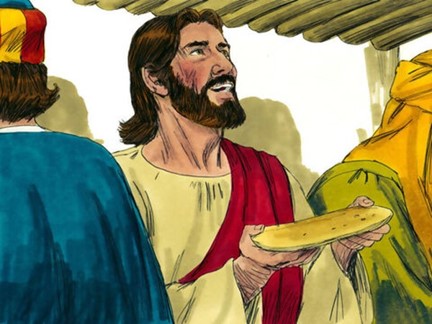
And He took a cup of wine and thanked God for it. Again, Jesus knew it was the last meal with His disciples, and His end on the earth was coming, but He gave thanks to God. Yes, Jesus gave thanks to God at the table with the one who sold. Then He gave it to His disciples and said, “Each of you drink from it, for this is my blood, which confirms the covenant between God and His people. It is poured out as a sacrifice to forgive the sins of many.”
Then Jesus sang a hymn and went out with His disciples and headed to the Mount of Olives as he usually did.
On the way, Jesus told them, “Tonight all of you will desert me. For the Scriptures say,
‘God will strike the Shepherd,
and the sheep of the flock will be scattered.’
But after I have been raised from the dead, I will go ahead of you to Galilee and meet you there.”
Jesus knew what would come. His disciples would desert Jesus and run away from Him. But Jesus kept saying, “for the Scriptures say.”
Peter was special and thought that he was the first among the Twelve. Peter declared, “Even if everyone else deserts you, I will never desert you.” Then the conversation quickly led to one of the saddest between Jesus and Peter.
Jesus replied, “I tell you the truth, Peter—this very night, before the rooster crows, you will deny three times that you even know me.”
“No!” Peter insisted. “Even if I have to die with you, I will never deny you!” It was Peter’s true heart at that time. However, Peter did not know what would come. As many of us know, Peter completely failed when the real danger came. And all the other disciples vowed the same following Peter. Later the rest of the Twelve also failed. None were with Jesus by leaving Him alone. Even so, Jesus kept walking to the Mount of Olives to fulfill the Scriptures as written.
Then Jesus went with them to the olive grove called Gethsemane, and He said, “Sit here while I go over there to pray.” He took Peter and Zebedee’s two sons, James and John, and became anguished and distressed. It was a truly difficult night at Gethsemane, where Jesus used to pray with His disciples, but the night was difficult. Jesus knew what was coming next. Thus, Jesus picked three top disciples, Peter, James, and John, and told them, “My soul is crushed with grief to the point of death. Stay here and keep watch with me.”

At that time, Jesus really needed Peter, James, and John and their prayer, and Jesus asked for their help in prayer. Then Jesus went on a little farther and bowed with his face to the ground, praying, “My Father! If it is possible, let this cup of suffering be taken away from me. Yet I want your will to be done, not mine.”
Then Jesus returned to the disciples and found them asleep. He said to Peter, “Couldn’t you watch with me for even one hour? Keep watch and pray, so that you will not give in to temptation. For the spirit is willing, but the body is weak!” Jesus did not talk to anyone but Peter. There were two other disciples.
Then Jesus left them a second time and prayed, “My Father! If this cup cannot be taken away unless I drink it, Your will be done.” What was Jesus’ prayer? It was “Your will be done.” Jesus did not pray for Himself but for God’s will. When Jesus returned to them again, He found them sleeping, for they couldn’t keep their eyes open. For this time, Jesus did not even bother to wake up Peter.

So he went to pray a third time, saying the same things again. What was Jesus’ prayer? Again, it was “Your will be done.” Then Jesus came to the disciples and said, “Go ahead and sleep. Have your rest. But look—the time has come. The Son of Man is betrayed into the hands of sinners. Up, let’s be going. Look, my betrayer is here!”
And even as Jesus said this, Judas, one of the twelve disciples, arrived with a crowd of men armed with swords and clubs. They had been sent by the leading priests and elders of the people. The traitor, Judas, had given them a prearranged signal: “You will know which one to arrest when I greet him with a kiss.” So Judas came straight to Jesus. “Greetings, Rabbi!” he exclaimed and gave him the kiss. Jesus let the thing happen.
Jesus said, “My friend, go ahead and do what you have come for.”
Then the others grabbed Jesus and arrested him. But one of the men with Jesus, who was Peter, pulled out his sword and struck the high priest’s slave, slashing off his ear.
“Put away your sword,” Jesus told him. “Those who use the sword will die by the sword. Don’t you realize that I could ask my Father for thousands of angels to protect us, and he would send them instantly? But if I did, how would the Scriptures be fulfilled that describe what must happen now?”
What was the last sentence of Jesus? “But if I did, how would the Scriptures be fulfilled that describe what must happen now?” is the answer.
The common theme of Jesus’ prayer was “to fulfill the Scripture as written.” Jesus kept praying for this, not for Himself, while asking for His own protection. Jesus prayed all things in prayer while asking God’s will, but Peter prepared and mentally exercised to protect Jesus with His sword. And as the time came, Peter used his sword.
What’s the purpose of Jesus’ life on earth? To the Scriptures be fulfilled, and God’s will be done. Jesus even gave thanks to God and taught his disciple who tried to protect Him with his sword, “But if I did [bring thousands of angels to protect my disciples and me], how would the Scriptures be fulfilled?”
Let’s go back to the Israelites. They met the enormous challenge that could easily wipe out their entire faith in God. They prayed earnestly to God for three days while fighting against their thirst, walking through the desert, and believing that God would provide what they prayed for. Then they finally saw an oasis. How marvelous a scene it was! They prayed, and they finally received an answer to their prayers. But the reality was truly harsh to them. The water found in the oasis was too bitter to drink.
Then why did God present the oasis, which only produced water too bitter to drink? God gave the Israelites a choice: either complain while rejecting the water provided or accept it with thanksgiving.
What did Jesus choose? His choice was thanksgiving, although He knew one of the Twelve sold Him. He gave thanks to God at the last Passover meal with the Twelve and took the Twelve to Gethsemane to pray together. But none of the Twelve could help, even the top three disciples who Jesus specially chose. That was the limitation of humans. But God sent an angel from heaven and strengthened Jesus.
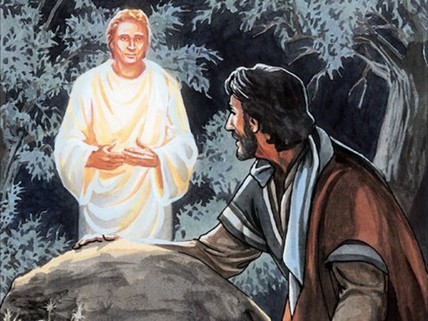
Jesus prayed more fervently. His sweat fell to the ground like great drops of blood because He was in such agony of spirit. Jesus was not alone, but an angel was with Him.
The Israelites complained and were against God, but Moses cried out to God despite the devastating disappointment that Moses experienced. Indeed, Moses could cry out to God not with his own strength but by the strength given by God. As a result, Moses prayed, but the rest of the Israelites complained and were angry at God.
Please visualize the situation: more than two million of the Israelites vs one Moses, which was the spiritual reality at that time. It was a spiritual battle in prayer. Then God showed Moses a piece of wood. Moses threw it into the water, making it good to drink. In the end, Moses prevailed in prayer with the strength provided by God.
Before concluding, let’s ask again. Did Moses pray to God by his own strength? The answer is no. God provided the strength Moses could pray. Then God provided as if a father helped his toddler grab a toy which was impossible by the toddler’s ability. Then the toddler made a joyful noise with the toy. Seeing his own toddler’s joy, the father too joyfully exclaimed, “Yeah, you did it,” with a great smile on his face to his toddler.
Jesus prayed in agony, but an angel appeared and strengthened Jesus. Moses also cried out to God in distress out of his own disappointment, but God strengthened Moses and made him pray against his own enormous disappointment and the incredible pressure from the rest of the two million plus Israelites. Then God showed Moses a piece of wood to be thrown in the bitter water.
What should be our prayer, then? “Not by our own will but by Your will” should be our prayer. And we should not forget that the source of our prayer’s strength in such a humanly impossible situation is God, not us.
Then what shall we do when we see something unexplainable, illogical, and unthinkable that gets in our lives, even if we have been praying for so hard and so long? Then we approach God to receive His strength to pray by giving thanks to God rather than complaining, analyzing, and being angry against God. Then God sends His Holy Spirit to our hearts to overcome it in the strength of the prayer of Jesus Christ: “Your will be done,” which is also our prayer to God for each of you today.
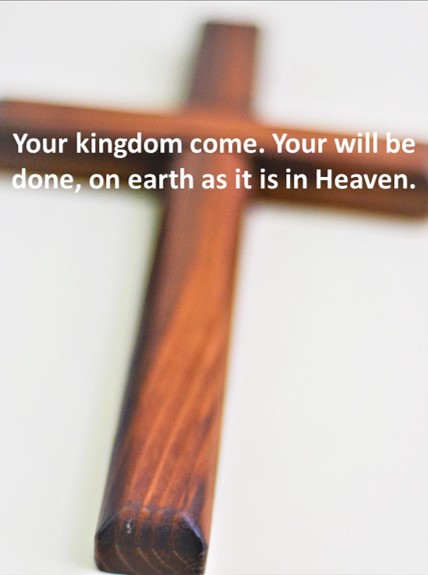
‘May the LORD bless you
and protect you.
May the LORD smile on you
and be gracious to you.
May the LORD show you his favor
and give you his peace.’ (Numbers 6:24-26)
